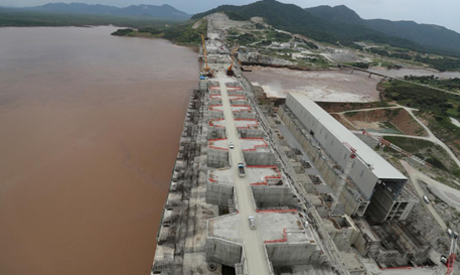
GERD might cause a sharp reduction in Egypt’s historic quota of Nile water
(photo: Reuters)
“Egypt is seeking a balanced agreement that allows Ethiopia to generate electricity — the purpose of building the dam — without encroaching on Egypt’s water rights and interests. Nile water is a matter of life or death for Egypt,” said Foreign Minister Sameh Shoukri in a statement issued a day after he and his Ethiopian and Sudanese counterparts met with the US secretary of the treasury and the president of the World Bank in Washington on 6 November.
“International mediation is likely to give a boost to deadlocked talks over the Grand Ethiopian Renaissance Dam [GERD], but without all parties sticking to a strict timetable we will return to the same vicious circle,” he said.
In a joint statement after the Washington meetings, the foreign ministers issued a timetable for further consultations to resolve outstanding differences, stressing their “joint commitment to reach a comprehensive, cooperative, adaptive, sustainable, and mutually beneficial agreement on the filling and operation of the GERD, and to establish a clear process for fulfilling that commitment in accordance with the 2015 Declaration of Principles”.
The statement was signed by the three African countries, the US and the World Bank.
Four technical meetings at the level of water ministers have been scheduled, and will be attended by observers from the World Bank and the US. The aim of the meetings is to reach an agreement by 15 January 2020. Should that not happen the Egyptian, Sudanese and Ethiopian foreign ministers will invoke Article 10 of the 2015 Declaration of Principles which states that they can ask for mediation or refer the matter to their heads of state.
Egypt has already requested international mediation, says Mohamed Hegazi, a former assistant to Egypt’s foreign minister. “The mediation of the World Bank is likely to be beneficial to all parties. It has intervened successfully in water disputes such as that between India and Pakistan in the 1950s,” he said.
In December 2017 Egypt suggested the World Bank be brought in to resolve tensions with Ethiopia over the dam. Ethiopia rejected the suggestion.
Last month Washington sent a letter to the three countries inviting them for a meeting with US Treasury Secretary Steven Mnuchin and World Bank President David Malpass in Washington on 6 November to discuss the dam.
Shoukri and his delegation held a series of intensive meetings in Washington to inform the American administration of Egypt’s technical and legal position.
Tripartite negotiations have repeatedly stalled over the timeframe for filling the reservoir of the dam and its operating process.
Recent proposals put forward by Egypt for a flexible reservoir-filling process that guarantees an annual flow of 40 billion cubic metres of water were rejected by Ethiopia. Addis Ababa said the conditions reflected colonial-era laws that discounted the rights of upriver countries.
In September and October two rounds of talks in Cairo and Khartoum ended in stalemate, prompting Cairo to seek international mediation.
Cairo has repeatedly voiced that the construction of the massive upstream Nile dam threatened Egypt’s sole source of fresh water.
The 1959 Nile Water Agreement between Egypt and Sudan guaranteed Egypt 55.5 billion cubic metres of Nile water annually, and Sudan 18.5 billion.
In 2015 Egypt and Ethiopia signed the Declaration of Principles which states that the two countries and Sudan should cooperate to reach an agreement on guidelines for filling the dam’s reservoir and its annual operation policies. Yet, after four years of negotiations, agreement seems as far away as ever. Observers now hope the US and World Bank can play a role in reaching an agreement acceptable to the three parties.
*A version of this article appears in print in the 14 November, 2019 edition of Al-Ahram Weekly.
Short link: